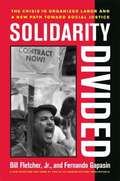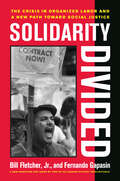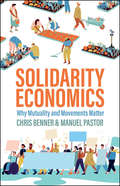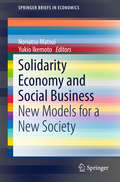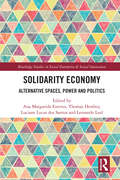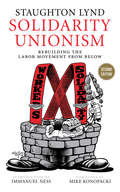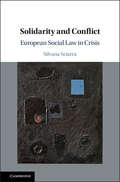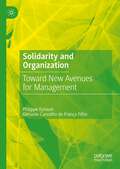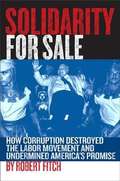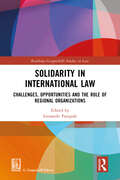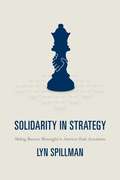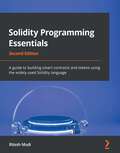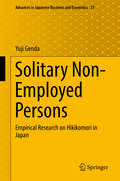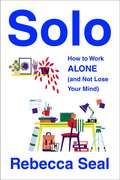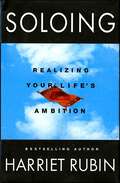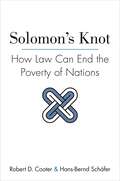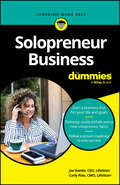- Table View
- List View
Solidarity Divided: The Crisis in Organized Labor and a New Path Toward Social Justice
by Fernando Gapasin Bill Fletcher Jr."Solidarity Divided" is a critical examination of labor's current crisis and a plan for a new way forward into the twenty-first century. Bill Fletcher and Fernando Gapasin, two longtime union insiders, offer a remarkable mix of vivid history and probing analysis. They chart changes in U.S. manufacturing, examine the onslaught of globalization, consider the influence of the environment on labor, and provide the first broad analysis of the fallout from the 2000 and 2004 elections on the U.S. labor movement.
Solidarity Divided: The Crisis in Organized Labor and a New Path toward Social Justice
by Fernando Gapasin Bill Fletcher Jr.The U.S. trade union movement finds itself today on a global battlefield filled with landmines and littered with the bodies of various social movements and struggles. Candid, incisive, and accessible, Solidarity Divided is a critical examination of labor's current crisis and a plan for a bold new way forward into the twenty-first century. Bill Fletcher and Fernando Gapasin, two longtime union insiders whose experiences as activists of color grant them a unique vantage on the problems now facing U.S. labor, offer a remarkable mix of vivid history and probing analysis. They chart changes in U.S. manufacturing, examine the onslaught of globalization, consider the influence of the environment on labor, and provide the first broad analysis of the fallout from the 2000 and 2004 elections on the U.S. labor movement. Ultimately calling for a wide-ranging reexamination of the ideological and structural underpinnings of today's labor movement, this is essential reading for understanding how the battle for social justice can be fought and won.
Solidarity Economics: Why Mutuality and Movements Matter
by Chris Benner Manuel PastorTraditional economics is built on the assumption of self-interested individuals seeking to maximize personal gain, but that is far from the whole story. Sharing, caring, and a desire to uphold the collective good are also powerful motives. In a world wracked by inequality, social divisions, and ecological destruction, can we build an alternative economics based on cooperation? In this book Chris Benner and Manuel Pastor invite us to imagine a new sort of solidarity economics – an approach grounded in our instincts for connection and community – and in so doing, actually build a more robust and sustainable economy. They argue that our current economy is already deeply dependent on mutuality, but that the inequality and fragmentation created by the status quo undermine this mutuality and with it our economic well-being. They outline the theoretical framing, policy agenda, and social movements that we need to revive solidarity and apply it to whole societies. Solidarity Economics is an essential read for anyone who longs for a fairer economy that can generate prosperity and preserve the planet.
Solidarity Economy and Social Business
by Noriatsu Matsui Yukio IkemotoThis book presents theoretical examinations of why and how connecting people yields different results from those of the market mechanism alone. With an ever-greater disparity between the world's rich and poor, actions have been taken to remove the imperfections and remedy malfunctions of the market mechanism. An underlying theme of these activities is to connect people and make them directly visible to one another; thus the integrating concept of the "solidarity economy" emerges. This volume analyzes diverse examples and practices of solidarity economy. Adam Smith emphasized the importance of "sympathy" among people and the role of the "impartial spectator" in order to control otherwise reckless markets. These major concepts form the basis of a solidarity economy. The examples and practices in this book are based on this framework. The first is the idea of social business, promoted by Prof. M. Yunus of the Grameen Bank. Although the group of five members in the Grameen Bank organization is considered a system of mutual surveillance by some economists, it is not a system based on distrust but a mechanism for mutual help and encouragement. Also examined in this book is organic agriculture, which adheres to the necessity of face-to-face relationships. It pursues environmental concerns and food safety by bringing together consumers and producers in local areas and by sharing knowledge. When consumers and producers are widely separated, a system of certification assures consumers that no chemical pesticides and fertilizers are used. Connecting consumers and producers through certification systems can be seen as part of fair trade mechanisms. These mechanisms are applied in certified coffee programs, for instance, to reduce poverty, to protect the environment, and to safeguard human rights. This book proposes that all these seemingly different types of activities can be understood as part of the solidarity economy. With this unifying theme, the book will be useful for both theoretical investigations and practical applications.
Solidarity Economy: Alternative Spaces, Power and Politics (Routledge Studies in Social Enterprise & Social Innovation)
by Thomas Henfrey Leonardo Leal Ana Margarida Esteves Luciane Lucas dos SantosSolidarity economy-based alternative spaces result from an interface among structural factors, institutional regimes and forms of collective action that mobilise narratives of change, collective identities and non-capitalist economic practices. This book analyses how solidarity economy initiatives develop alternative spatialities as counterpower to mainstream economy. Based on case studies in Europe, Latin America, Africa and Asia, it elaborates on how different scales of solidarity economy-based alternative spaces result from an interface among structural factors, institutional regimes and forms of collective action that mobilise narratives of change, collective identities and non-capitalist economic practices.
Solidarity Unionism at Starbucks (PM Pamphlet)
by Staughton Lynd Daniel GrossLegendary legal scholar Staughton Lynd teams up with influential labor organizer Daniel Gross in this exposition on solidarity unionism, the do-it-yourself workplace organizing system that is rapidly gaining prominence around the country and around the world. Lynd and Gross make the audacious argument that workers themselves on the shop floor, not outside union officials, are the real hope for labor's future. Utilizing the principles of solidarity unionism, any group of co-workers, like the workers at Starbucks, can start building an organization to win an independent voice at work without waiting for a traditional trade union to come and "organize" them. Indeed, in a leaked recording of a conference call, the nation's most prominent union-busting lobbyist coined a term, "the Starbucks problem," as a warning to business executives about the risk of working people organizing themselves and taking direct action to improve issues at work. Combining history and theory with the groundbreaking practice of the model by Starbucks workers, Lynd and Gross make a compelling case for solidarity unionism as an effective, resilient, and deeply democratic approach to winning a voice on the job and in society.
Solidarity Unionism: Rebuilding the Labor Movement from Below
by Staughton Lynd Immanuel NessCritical reading for all who care about the future of labor, Solidarity Unionism draws deeply on Staughton Lynd's experiences as a labor lawyer and activist in Youngstown, Ohio, and on his profound understanding of the history of the Congress of Industrial Organizations (CIO). The book helps us begin to put not only movement, but also vision, back into the labor movement. There is a blossoming of rank-and-file worker organizations throughout the world that are countering rapacious capitalists and labor leaders who think they know more about work and struggle than their own members. To secure the gains of solidarity unions, Lynd has proposed parallel bodies of workers who share the principles of rank-and-file solidarity and can coordinate the activities of local workers' assemblies. Detailed and inspiring examples include experiments in workers' self-organization across industries in steel-producing Youngstown, as well as horizontal networks of solidarity formed in a variety of U.S. cities and successful direct actions overseas. This book is not a prescription but reveals the lived experience of working people continuously taking risks for the common good.
Solidarity and Conflict: European Social Law In Crisis
by Silvana SciarraThe ongoing austerity crisis is being felt in all sectors of EU law, but has had a particularly severe impact on labour law. <P><P>Silvana Sciarra, a leading judge and scholar of EU employment law, considers how solidarity regimes have been shaken by the crisis. She brings together existing European policies in social and employment law, to enhance synergies and developments in a post-crisis discourse. She looks at reactions of national constitutional courts to austerity measures and of international organizations in re-establishing respect of fundamental workers' rights. <P>Criticizing soft law approaches in employment policies, she favours recourse to binding measures connected with selective financial incentives through European funds. She highlights developments in European sector social dialogue and new horizons of transnational collective bargaining in large multinationals. Taking a positive, practical approach, Sciarra shows how social policies can enhance solidarity and social cohesion, through European financial support. <P>Provides a critical and constructive point of view on European social law developments.<P> Combines information on legal sources with proposals for better policy making.<P> Discusses highly topical issues around austerity and workers' rights.
Solidarity and Fragmentation: Working People and Class Consciousness in Detroit, 1875-1900 (Working Class in American History)
by Richard Jules OestreicherHow did the interplay between class and ethnicity play out within the working class during the Gilded Age? Richard Jules Oestreicher illuminates the immigrant communities, radical politics, worker-employer relationships, and the multiple meanings of workers' affiliations in Detroit at the end of the nineteenth century.
Solidarity and Organization: Toward New Avenues for Management
by Philippe Eynaud Genauto Carvalho de França FilhoSolidarity is an ‘unthought’ in the fields of organizational theory and management sciences. However, it is an increasingly important feature in the management of organizations. The contemporary world suffers from a double unsustainability: the abusive exploitation of natural resources endangers the balance of the climate and biodiversity, while growing inequalities condemn our ability to maintain a balanced society. These unsustainabilities are mutually reinforcing and call for the affirmation of a double solidarity, which unites humans among themselves, and links humans and nonhumans. Such an effort cannot be decreed. It must be organized.Based on numerous grassroots initiatives and citizens’ experimentations that are being invented every day around the world and on a historical and anthropological approach, this book explores different ways of combining solidarity and organization. Solidarity-based management, governance of the commons, and Buen Vivir approaches are some of the perspectives analyzed in the context of a North-South dialogue in order to formulate the conceptual framework and practical steps of a social and environmental transition. It offers both theoretical background and living examples to students, professors and researchers to better understand and better teach new avenues for management.
Solidarity for Sale: How Corruption Destroyed the Labor Movement and Undermined America's Promise
by Robert FitchThis book is a fascinating, definitive history and analysis of American labor union corruption--and an urgent call for social justice.
Solidarity in Europe: Citizens' Responses In Times Of Crisis (Palgrave Studies In European Political Sociology Series)
by Christian Lahusen Maria T. GrassoThis open access volume provides evidence-based knowledge on European solidarity and citizen responses in times of crisis. Does the crisis of European integration translate into a crisis of European solidarity, and if yes, what are the manifestations at the level of individual citizens? How strongly is solidarity rooted at the individual level, both in terms of attitudes and practices? And which driving factors and mechanisms contribute to the reproduction and/or corrosion of solidarity in times of crisis? Using findings from the EU Horizon 2020 funded research project “European paths to transnational solidarity at times of crisis: Conditions, forms, role-models and policy responses” (TransSOL), the books addresses these questions and provides cross-national comparisons of eight European countries – Denmark, France, Germany, Greece, Italy, Poland, Switzerland, and the UK. It will appeal to students, scholars and policymakers interested in the Eurocrisis, politics and sociology.
Solidarity in International Law: Challenges, Opportunities and The Role of Regional Organizations (Routledge-Giappichelli Studies in Law)
by Leonardo PasqualiThe principle of solidarity is particularly important now because it is in juxtaposition to some current self-centered trends in politics: the crises that have upset the world in recent years, such as migrations, hegemonic aspirations, pandemics, and wars, have made self-evident the inadequacy of such selfish politics. It therefore seems very useful to understand the role that solidarity could play in contemporary scenarios. This book thus collects various contributions on the principle of solidarity in international law. Firstly, it reconstructs the foundations of solidarity in law and investigates the origins of the principle. Subsequently, it tries to ascertain if solidarity exists as a principle in international law and, if so, what its scope is. The book then examines the eventual implementation of the principle of solidarity in regional organizations law: the question is whether solidarity is more effective and if it is actually better fulfilled when relationships between states get stronger, such as in regional and sub-regional organizations. Such implementation is notable in EU Law, but the analysis also involves other regional and sub-regional organizations, namely the African Union, ECOWAS, the League of Arab States, and MERCOSUR. This book takes into account not only some distinctive areas of solidarity, such as migration law, or specific institutional contexts where solidarity is a declared principle, objective or value, for example, the European Union, but it also considers whether, and to what extent, the manifestations of solidarity differ in disparate settings, trying to discover the reasons behind such divergences. The book will be of interest to researchers and academics in the areas of International Law, International Organizations Law, European Law, Human Rights Law, Business Law, and Constitutional Law.
Solidarity in Strategy: Making Business Meaningful in American Trade Associations
by Lyn SpillmanPopular conceptions hold that capitalism is driven almost entirely by the pursuit of profit and self-interest. Challenging that assumption, this major new study of American business associations shows how market and non-market relations are actually profoundly entwined at the heart of capitalism. In Solidarity in Strategy, Lyn Spillman draws on rich documentary archives and a comprehensive data set of more than four thousand trade associations from diverse and obscure corners of commercial life to reveal a busy and often surprising arena of American economic activity. From the Intelligent Transportation Society to the American Gem Trade Association, Spillman explains how business associations are more collegial than cutthroat, and how they make capitalist action meaningful not only by developing shared ideas about collective interests but also by articulating a disinterested solidarity that transcends those interests. Deeply grounded in both economic and cultural sociology, Solidarity in Strategy provides rich, lively, and often surprising insights into the world of business, and leads us to question some of our most fundamental assumptions about economic life and how cultural context influences economic.
Solidarity in the European Union
by Andreas Grimmel Susanne My GiangThis volume approaches the current crisis of solidarity in the European Union from a multidisciplinary perspective. The contributions explore the concept of solidarity, its role in the European integration process, and analyze the risks entailed by a lack of solidarity. Experts from various academic fields, such as political science, law, sociology, and philosophy, shed new light on contemporary challenges such as the migrant and refugee crisis, the Eurozone crisis, nationalist and separatist movements, and Brexit. Finally, they also discuss different solutions for the most pressing problems in EU politics. The book has two main aims: Firstly, to show that solidarity is a key element in solving the EU's contemporary problems; and secondly, to reveal how the crisis of solidarity has become a crucial test for the integration project, as the nature of the crisis goes beyond the well-known shortcomings in the EU's structure and problem-solving capacities.
Solidarités provinciales: Histoire de la Fédération des travailleurs et travailleuses du Nouveau-Brunswick
by David Frank Réjean OuelletteLa Fédération des travailleurs et travailleuses du Nouveau-Brunswick, fondée en 1913, est la deuxième plus ancienne fédération provinciale du travail au Canada. Son histoire remonte aux premières campagnes en faveur de l’indemnisation des accidents du travail et de la reconnaissance syndicale, et elle se poursuit dans les plus récentes luttes visant à défendre les normes sociales et à protéger les emplois et les droits syndicaux. La Fédération a vu le jour dans la ville portuaire de Saint John et le centre ferroviaire de Moncton, puis elle s’est étendue aux travailleurs des mines et des usines du nord de la province, soutenant la cause des employés du secteur public et des travailleuses, reflétant les réalités de la vie et du travail dans une société bilingue. Puisant dans les archives, les journaux et les expériences des travailleurs et des travailleuses, voici l’histoire inédite de solidarités syndicales provinciales qui ont surmonté les divisions et les revers afin de rehausser le statut des travailleurs et des travailleuses dans la société néo-brunswickoise. Par cette étude pionnière rédigée dans un style clair et puissant, Frank apporte une contribution originale à la compréhension de l’évolution politique, économique et sociale de la province, et il aide à combler le besoin d’éclairer la connaissance que le public a de l’histoire des travailleurs et des syndicats de toutes les régions du Canada.
Solidity Programming Essentials: A guide to building smart contracts and tokens using the widely used Solidity language, 2nd Edition
by Ritesh ModiA comprehensive guide sprinkled with lots of hands-on code samples to get you up and running with Solidity and writing your smart contracts on Blockchain and EthereumKey FeaturesLearn proven smart contract implementation challenges and solve them using SolidityGo deeper into Solidity to write effective upgradable and maintainable smart contracts using best practicesGet to grips with the latest version of Solidity with updated codes and examplesBook DescriptionSolidity is a high-level language for writing smart contracts, and the syntax has large similarities with JavaScript, thereby making it easier for developers to learn, design, compile, and deploy smart contracts on large blockchain ecosystems including Ethereum and Polygon among others. This book guides you in understanding Solidity programming from scratch.The book starts with step-by-step instructions for the installation of multiple tools and private blockchain, along with foundational concepts such as variables, data types, and programming constructs. You'll then explore contracts based on an object-oriented paradigm, including the usage of constructors, interfaces, libraries, and abstract contracts. The following chapters help you get to grips with testing and debugging smart contracts. As you advance, you'll learn about advanced concepts like assembly programming, advanced interfaces, usage of recovery, and error handling using try-catch blocks. You'll also explore multiple design patterns for smart contracts alongside developing secure smart contracts, as well as gain a solid understanding of writing upgradable smart concepts and data modeling. Finally, you'll discover how to create your own ERC20 and NFT tokens from scratch.By the end of this book, you will be able to write, deploy, and test smart contracts in Ethereum.What you will learnWrite efficient, effective, and secure smart contractsCode, compile, and test smart contracts in an object-oriented wayImplement assembly code in SolidityAdopt upgradable and haltable ownership and security design patternsUnderstand exception handling and debugging in SolidityCreate new ERC20 and NFT tokens from the ground upWho this book is forThis Ethereum book is primarily aimed at beginners who want to get started with Solidity Programming for developing an Ethereum smart contract. No prior knowledge of EVM is required, but knowing the basics of any programming language will help you follow along.
Solitary Non-Employed Persons: Empirical Research on Hikikomori in Japan (Advances in Japanese Business and Economics #23)
by Yuji GendaThis book is devoted to offering a new concept of non-employment caused by social exclusion. Among labor economic studies, it is the first attempt to investigate the conditions of jobless persons who have completely lost opportunities for daily communication with others. The new concept provided by this book is “solitary non-employed persons (SNEP).” SNEP are defined as non-employed persons who are normally entirely alone or do not spend time with people other than their family. According to a detailed time-use survey in Japan, SNEP make up almost 70 % of single, jobless persons aged 20 to 59. The number of SNEP doubled in the 2000s. As a serious issue for non-employment, economists and sociologists have focused on long-term unemployed persons and persons “not in education, employment, or training” (NEET), which include discouraged persons resigning from work. These serious non-employment issues are attributable to and further aggravated by the isolation experienced by the SNEP. Social withdrawal—that is, the hikikomori who stay indoors—is one notable feature of Japanese youth problems in many cases. Large numbers of the middle-aged jobless Japanese also currently shut themselves in their rooms. The objective approach by the SNEP concept enables us to understand the reality of these withdrawn persons who are now growing in number in many countries. A continuous increase in the number of SNEP will cause several difficulties in society and the economy. SNEP will not make their own livings after the deaths of their families, causing social security costs and financial deficits to further accumulate in the efforts to help them. A shortage of an attractive labor force will accelerate in the future due to the expansion of SNEP within the young and middle-aged populations. This book proposes appropriate policies to prevent an increase in SNEP in such a way as to generate skilled professionals, as well as to reach out and support them. It will contribute to developing studies for jobless people closely involved in social exclusion, and to finding universal and effective solutions for their inclusion.
Solo Travel, Tourism and Loneliness: A Critical Sociology (Routledge Focus on Tourism and Hospitality)
by Maximiliano E. Korstanje Hugues SéraphinThis timely and topical book presents a unique critical exploration of the sociology of single travel and theory of consumption in relation to loneliness and tourism.Logically structured and interdisciplinary in scope, this book introduces disrupting questions around the convergence of the post-modern self in relation to solo travel post-pandemic, with chapters exploring topics such as romantic loneliness, the benefits and drawbacks of single travel in a globalized world, the influence of technology on solo travel and the impact of sex tourism. International case studies and examples are given throughout and the book is richly illustrated and data-led. The volume looks to the future, exploring relevant trends and the development of new products and services in the next few years.This volume is a pivotal resource for students, scholars and academics with an interest in tourism and mobility studies, international relations, development economics, crisis management, sociology and public policy. The book may also be of professional interest to practitioners and policymakers dedicated to tourism sociology and sociology of tourism consumption.
Solo oro
by John C. MaxwellLos líderes pueden acelerar su crecimiento con este compañero que selecciona cuidadosamente la sabiduría sobre liderazgo y las mejores prácticas de los libros de gran éxito de ventas de Maxwell para complementar Liderazgo, principios de oro.Todo líder quiere vivir a la altura de su potencial. Pero el éxito no sucede de la noche a la mañana, y requiere ímpetu y perseverancia convertirse en el mejor líder posible. Solo oro está diseñado para ayudar a los lectores a lograr precisamente eso. Basándose en las 26 lecciones invalorables de Liderazgo, principios de oro, este recurso ofrece sabiduría sobre liderazgo y las mejores prácticas de los libros de gran éxito de ventas de la carrera fructífera de Maxwell.
Solo oro
by John MaxwellLos líderes pueden acelerar su crecimiento con estecompañero que selecciona cuidadosamente la sabiduría sobre liderazgo ylas mejores prácticas de los libros de gran éxito de ventas de Maxwellpara complementar Liderazgo, principios de oro.Todolíder quiere vivir a la altura de su potencial. Pero el éxito no sucedede la noche a la mañana, y requiere ímpetu y perseverancia convertirseen el mejor líder posible. Solo oro está diseñado para ayudar a los lectores a lograr precisamente eso. Basándose en las 26 lecciones invalorables de Liderazgo, principios de oro,este recurso ofrece sabiduría sobre liderazgo y las mejores prácticasde los libros de gran éxito de ventas de la carrera fructífera deMaxwell.
Solo: How to Work Alone (and Not Lose Your Mind)
by Rebecca Seal&“Kind, realistic, and genuinely helpful...Install a copy on whatever surface is functioning as your desk, and you may even feel a little bit less alone.&” —The Observer (London) A practical, accessible, and charming guide for finding joy while navigating your professional life working remotely from home—without losing your mind.Like it or not, working alone is now the new normal. The COVID-19 pandemic may have accelerated the process, but the trend is clear—making a living outside the confines of a public workplace is here to stay. For anyone who needs guidance on how to navigate working from a home office—or a home sofa—here is a charming, expert, and genuinely helpful guide to managing a productive career without impromptu hallway conversations or on-call IT support, but with more joy—and, for most of us, better coffee. Written by a dedicated work-from-home expert, Solo culls wisdom from the latest research in psychology, economics, and social science and explores what we gain, or lose, in the shift to solo work. In chapters like &“Loneliness and Solitude,&” &“The Power of Planning,&” and &“The Curse of Comparison (and Why Social Media Sucks),&” it picks up where the bibles for freelancers stop, offering practical, inspiring, and uniquely reassuring advice culled from a range of influences, from Aesop&’s fables to medical journals, and explaining what helps us stay resilient, productive, and focused in a company of one.
Soloing: Realizing Your Life's Ambition
by Harriet RubinSoloing has two meanings: "going it alone" and being "complete in yourself." . . . But you don't just leave--a company/a career/a paycheck--and cross over to a more satisfying life. There's more to it. There is a mysterious passage to be negotiated, a delicate transition required to go from alone-in-the-desert to complete-in-yourself.Harriet Rubin, bestselling author of The Princessa: Machiavelli for Women, returns with inspiring advice for professionals dreaming of crossing over from a corporate world of prescribed boundaries to the limitless opportunities of soloing. She describes how people can do great things--things they would never be able to accomplish inside the corporate structure--when they manage or lead no one.As one successfully navigates the passage toward a truer sense of self that Rubin describes, four invaluable freedoms await:The first freedom is regaining your sense of identity.Walk out of any big company and who are you, stripped of that mighty identity? Potentially bigger and better than before. Who were you before the corporate you? To get back one's sense of self is why people go solo.The second freedom is independence.Why is working alone so important in doing great work, given that it's also the scariest part? Imagine having complete command and control over your time and the work you do. This is how soloists realize their great strengths: They are reduced to themselves.The third freedom is income.You can earn in one year what you earned in two before. Do you work harder to do this? Yes. Do you enjoy it more? Yes. Solo money is alive. Unlike a salary doled out like an allowance from parents, the money earned by soloing is a true emblem of a person's worth.The fourth freedom is illumination.A professional builds a career, but a soloist builds a portfolio and a life free of boredom, full of challenge. Direct contact with work itself is direct contact with life.With insights as diverse as Henry David Thoreau's "I want to be sure the world doesn't change," and Michael Jordan's response to the statement: "There's no 'I' in team,"--"That's right, but there is an 'I' in win,"--Rubin gives readers the chance to bring their dreams into alignment with reality.
Solomon's Knot: How Law Can End the Poverty of Nations (The Kauffman Foundation Series on Innovation and Entrepreneurship #9)
by Robert D. Cooter Hans-Bernd SchäferWhy law is critical to innovation and economic growthSustained growth depends on innovation, whether it's cutting-edge software from Silicon Valley, an improved assembly line in Sichuan, or a new export market for Swaziland's leather. Developing a new idea requires money, which poses a problem of trust. The innovator must trust the investor with his idea and the investor must trust the innovator with her money. Robert Cooter and Hans-Bernd Schäfer call this the "double trust dilemma of development." Nowhere is this problem more acute than in poorer nations, where the failure to solve it results in stagnant economies.In Solomon's Knot, Cooter and Schäfer propose a legal theory of economic growth that details how effective property, contract, and business laws help to unite capital and ideas. They also demonstrate why ineffective private and business laws are the root cause of the poverty of nations in today's world. Without the legal institutions that allow innovation and entrepreneurship to thrive, other attempts to spur economic growth are destined to fail.
Solopreneur Business For Dummies
by Joe Rando Carly RiesCreate and run your one-person business with pro advice and strategic tools Solopreneur Business For Dummies offers advice and tools to create, grow, and manage your business when you're going it alone. Unlike entrepreneurs, solopreneurs typically create their businesses to serve their lives—instead of trying to scale as much as possible. To thrive in this lifestyle, you'll need to understand the basics of business operations, financial management, sales, and marketing. You'll also need to learn how to do all these things without burning yourself out. This book has you covered in all those areas. You'll also learn how to create a support network that offers guidance, emotional support, and business opportunities. Set your business up for success with this no-nonsense Dummies guide. Build a successful business from the ground up—without employees Avoid the common mistakes that derail many new businesses Develop a viable business idea that aligns with your personal goals and your desired lifestyle Learn the best practices from the big guys, tailored for a one-person business Discover tech tools that can make it easier to run your business Learn from the stories of successful solopreneurs across industries Solopreneur Business For Dummies is a practical and easy-to-understand resource that makes it easy to start your own solo venture. Get the tools and insights you need to navigate the challenging yet rewarding path.
